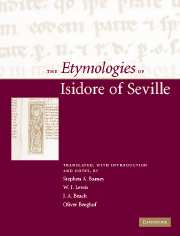Book contents
- Frontmatter
- Contents
- Acknowledgements
- Note to the Reader
- INTRODUCTION
- THE ETYMOLOGIES
- Analytical table of contents
- Book I Grammar (De grammatica)
- Book II Rhetoric and dialectic (De rhetorica et dialectica)
- Book III Mathematics (De mathematica)
- Book IV Medicine (De medicina)
- Book V Laws and times (De legibus et temporibus)
- Book VI Books and ecclesiastical offices (De libris et officiis ecclesiasticis)
- Book VII God, angels, and saints (De deo, angelis et sanctis)
- Book VIII The church and sects (De ecclesia et sectis)
- Book IX Languages, nations, reigns, the military, citizens, family relationships (De linguis, gentibus, regnis, militia, civibus, affinitatibus)
- Book X Vocabulary (De vocabulis)
- Book XI The human being and portents (De homine et portentis)
- Book XII Animals (De animalibus)
- Book XIII The cosmos and its parts (De mundo et partibus)
- Book XIV The earth and its parts (De terra et partibus)
- Book XV Buildings and fields (De aedificiis et agris)
- Book XVI Stones and metals (De lapidibus et metallis)
- Book XVII Rural matters (De rebus rusticis)
- Book XVIII War and games (De bello et ludis)
- Book XIX Ships, buildings, and clothing (De navibus aedificiis et vestibus)
- Book XX (Provisions and various implements)
- APPENDIX Correspondence of Isidore and Braulio
- INDEX
Book XIII - The cosmos and its parts (De mundo et partibus)
Published online by Cambridge University Press: 22 September 2009
- Frontmatter
- Contents
- Acknowledgements
- Note to the Reader
- INTRODUCTION
- THE ETYMOLOGIES
- Analytical table of contents
- Book I Grammar (De grammatica)
- Book II Rhetoric and dialectic (De rhetorica et dialectica)
- Book III Mathematics (De mathematica)
- Book IV Medicine (De medicina)
- Book V Laws and times (De legibus et temporibus)
- Book VI Books and ecclesiastical offices (De libris et officiis ecclesiasticis)
- Book VII God, angels, and saints (De deo, angelis et sanctis)
- Book VIII The church and sects (De ecclesia et sectis)
- Book IX Languages, nations, reigns, the military, citizens, family relationships (De linguis, gentibus, regnis, militia, civibus, affinitatibus)
- Book X Vocabulary (De vocabulis)
- Book XI The human being and portents (De homine et portentis)
- Book XII Animals (De animalibus)
- Book XIII The cosmos and its parts (De mundo et partibus)
- Book XIV The earth and its parts (De terra et partibus)
- Book XV Buildings and fields (De aedificiis et agris)
- Book XVI Stones and metals (De lapidibus et metallis)
- Book XVII Rural matters (De rebus rusticis)
- Book XVIII War and games (De bello et ludis)
- Book XIX Ships, buildings, and clothing (De navibus aedificiis et vestibus)
- Book XX (Provisions and various implements)
- APPENDIX Correspondence of Isidore and Braulio
- INDEX
Summary
Now in this little book we have noted in a short sketch, as it were, certain principles of the heavenly bodies and locations of the land and expanses of the sea, so that the reader may go through them in a short time, and through this succinct brevity come to know their etymologies and causes.
i. The world (De mundo) 1. The world consists of the sky and the land, the sea and the creations of God within them. Whence it is said (John 1:10): “And the world was made by him.” ‘World’ (mundus) is named thus in Latin by the philosophers, because it is in eternal motion (motus), as are the sky, the sun, the moon, the air, the seas. Thus no rest is allowed to its elements; on this account it is always in motion. 2. Whence to Varro the elements seemed to be animate, “Because,” he says, “they move of their own accord.” But the Greeks adopted a term for world (mundus, also meaning “cosmetics”) derived from ‘ornament,’ on account of the diversity of elements and the beauty of the heavenly bodies. They call it κόσμος, which means “ornament,” for with our bodily eyes we see nothing more beautiful than the world.
3. There are four zones in the world, that is, four regions: the East and the West, the North and the South. 4. The East (oriens) is named from the rising (exortus) of the sun.
- Type
- Chapter
- Information
- The Etymologies of Isidore of Seville , pp. 271 - 284Publisher: Cambridge University PressPrint publication year: 2006

